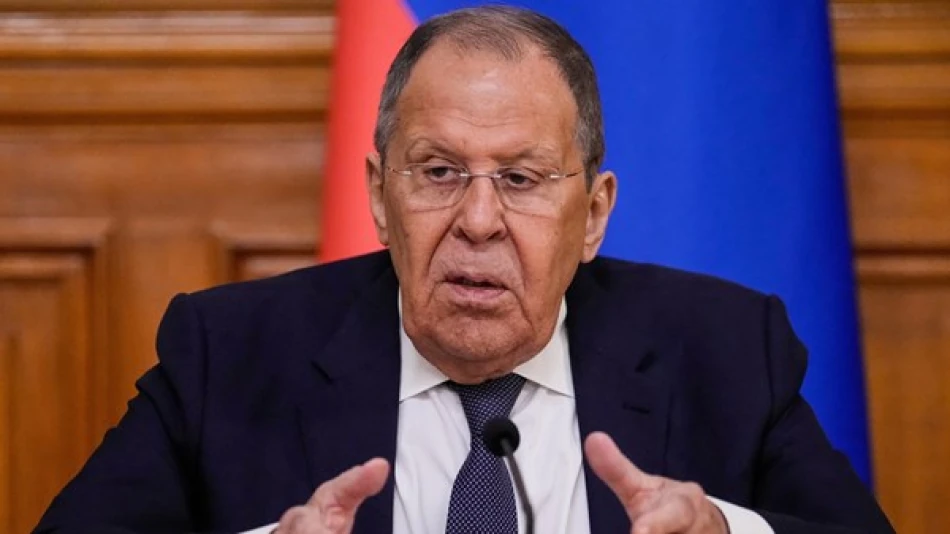
لافروف يرد على سؤال بشأن لقاء بوتين وزيلينسكي
Putin-Zelensky Summit Remains Distant as Russia Sets Preconditions for Peace Talks
Russian Foreign Minister Sergey Lavrov has dismissed immediate prospects for a meeting between Presidents Vladimir Putin and Volodymyr Zelensky, signaling that Moscow will only engage in high-level diplomacy after key preconditions are met—including Ukraine's exclusion from NATO and territorial concessions. The statement underscores the wide gulf between Russian demands and Ukrainian red lines, even as President Donald Trump pushes for direct negotiations to end the nearly three-year conflict.
Russia's Strategic Positioning on Negotiations
In an interview with NBC, Lavrov emphasized that Putin remains "ready to meet Zelensky when the agenda for this summit is ready," but crucially added that "this agenda is not ready at all." This language reflects Russia's calculated approach to peace talks—positioning itself as open to dialogue while maintaining that substantive discussions can only occur on Moscow's terms.
The Kremlin's insistence on relegating any Putin-Zelensky summit to the "final stage" of peace negotiations reveals a key strategic calculation. By demanding that working-level agreements precede any high-profile meeting, Russia aims to avoid the diplomatic risk of a failed summit while ensuring that any eventual face-to-face encounter serves primarily to formalize predetermined outcomes.
Trump's Diplomatic Challenge
President Trump's proposal to bring both leaders "around one table" faces significant structural obstacles that extend beyond personal diplomacy. The fundamental disconnect lies not in communication channels but in incompatible war aims: Russia seeks territorial gains and security guarantees that would effectively neutralize Ukraine, while Ukraine demands territorial integrity and Western security commitments.
Lavrov's reference to Washington wanting both sides to accept "a number of principles" suggests that American mediators are already working to identify potential compromise frameworks. However, the specific principles mentioned—Ukrainian neutrality and territorial concessions—align closely with Russia's maximalist position from the conflict's early stages.
Historical Context and Precedent
This dynamic mirrors other protracted conflicts where preliminary agreements proved essential before successful summits. The 1978 Camp David Accords required extensive groundwork before bringing Egyptian President Sadat and Israeli Prime Minister Begin together, while the Good Friday Agreement involved years of multi-party negotiations before final high-level endorsement.
However, the Ukraine conflict presents unique complications. Unlike historical peace processes where both sides faced military stalemates, Russia currently occupies approximately 20% of Ukrainian territory and shows little indication of military pressure forcing concessions on core demands.
Market and Geopolitical Implications
The absence of near-term summit prospects maintains uncertainty across multiple sectors. Energy markets continue pricing in prolonged conflict scenarios, while defense contractors benefit from sustained Western military aid commitments. European economies remain vulnerable to escalation risks, particularly regarding energy infrastructure and grain exports.
For investors, Lavrov's statements signal that any peace dividend remains distant. The requirement for comprehensive preliminary agreements before high-level meetings suggests that even preliminary diplomatic progress could take months or years, extending the current geopolitical risk premium across affected markets.
The Agenda Problem
Russia's emphasis on agenda preparation reveals the core diplomatic challenge: both sides view concessions demanded by their opponent as existential threats. Ukraine cannot accept territorial losses or NATO exclusion without undermining its post-2014 national project, while Russia cannot accept Ukrainian NATO membership or territorial restoration without acknowledging strategic defeat.
This creates a classic negotiation deadlock where the preconditions for talks effectively predetermine outcomes in ways unacceptable to one party. Until external pressures—military, economic, or domestic political—shift these fundamental positions, even Trump's deal-making approach faces limited prospects for breakthrough.
Most Viewed News

 Layla Al Mansoori
Layla Al Mansoori






